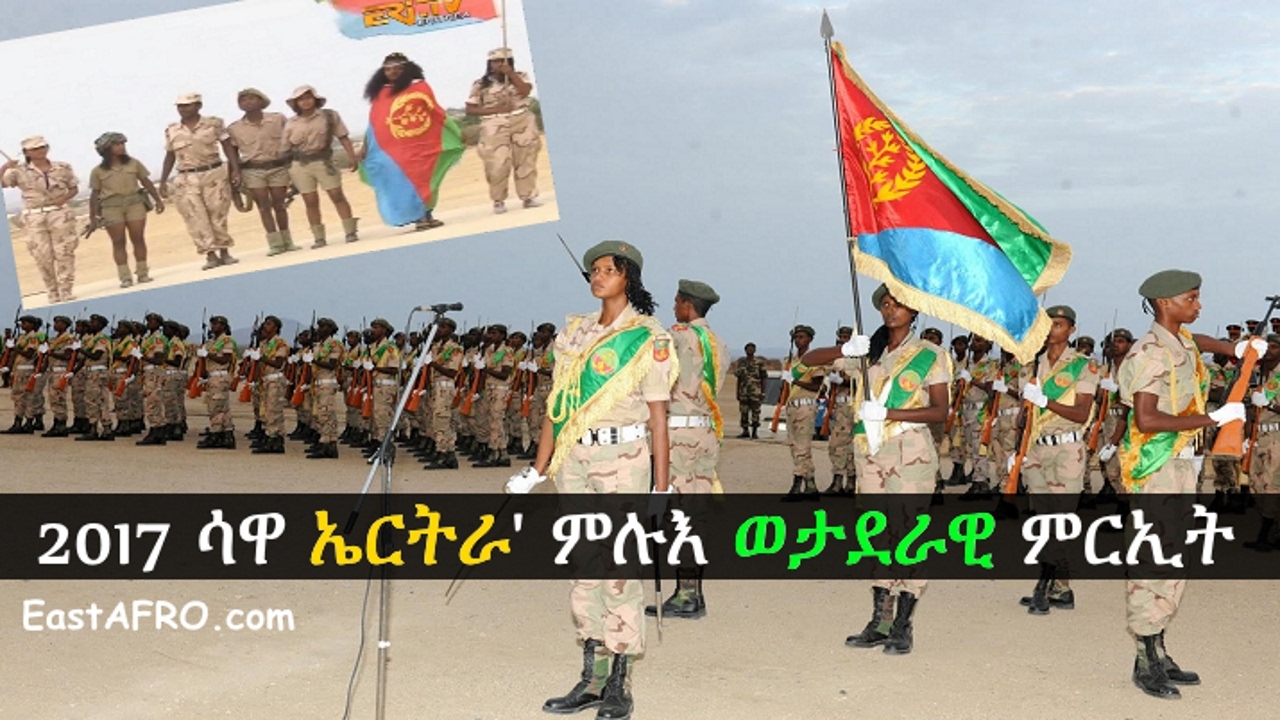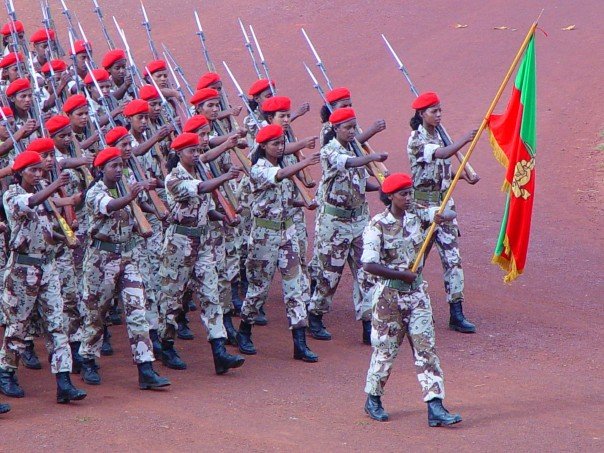Ten years ago, like other adolescents in the northeast African country of Eritrea, Luwam Estifanos was taken to Sawa, a military camp near the Sudanese border. At Sawa, where Eritreans are taken for their final year of high school, they are also embarking on what can become a lifetime of forced service.
“After the age of 16, your life is not yours until god knows when,” says Luwam, who is now a human rights campaigner and university student. Living in Norway, the 27-year-old describes her native Eritrea as an open prison: “It’s actual slavery, because the service is non-stop,” she explains. “There is no end to it—you can serve for your whole life. We lose our youth there.”
Eritrea is described by Human Rights Watch as the North Korea of Africa. Coupled with the trademarks of authoritarianism—a denial of free speech and free movement; arbitrary imprisonment and torture; religious persecution—the small country’s unique system of compulsory, open-ended military service for citizens makes it one of the most oppressive states in the world.
Videos by VICE
The government has enforced its current policy of sending all secondary school students, girls as well as boys, to serve for a minimum period of twelve months since 2003. But the conclusion of service remains open-ended.
Under Eritrean law the minimum conscription age is 18, but as it was for Luwam, most teenagers find themselves recruited during high school at age 16 or even younger. In rural areas, where formal education is more rare, the army will visit villages to round up young girls and boys who look roughly of age, to begin their program of combat training and forced labour.
“As girls, we were treated just like [male] soldiers,” says Luwam. A typical day would start at 5:30 AM, with two hours of running before sunrise, followed by 12 hours of weapons training, marching, and cleaning. Girls are forced to engage in all the same activities as boys—often having to repeat a full year’s training simply because they are unable to properly handle the heavy weaponry.

Specific forms of treatment; however, are reserved for women and girls: “Many female conscripts are subject to sexual assault and harassment by higher ranks in the military,” explains Luwam. “There is normally one girl for every 16 or 17 men, and you all have to sleep in one room. During our training, we were careful not to get close to guys or be alone with them, but this can be hard to avoid. Unless you serve them—making food or coffee—you become a target. After our training, we heard of a lot of girls who got pregnant.”
These anecdotal risks are reflected in statistics on assault during military training. A recent report by Amnesty found that of the 14,000 people who graduated from Sawa camp in 2016, 48 percent were women who had experienced some form of gender-specific violation—including sexual enslavement, torture, and abuse.
As Luwam explains, this notorious record of rape and sexual harassment means that lower-ranking officers are often careful to hide these sorts of behaviours. However, they will openly inflict a catalogue of other gender-specific punishments on young women, especially if any became sick. “They would make you jump from the top of a building, or beat you heavily. Or if you lost your voice, they would bring snakes and scorpions to try to make you scream. So if anyone got sick, we had to try hard to hide it.”
Meron Estefanos, the Stockholm-based director of the Eritrean Initiative on Refugee Rights, says a young woman’s fate at Sawa is most likely to be determined by how she looks.
“Within the military, people laugh about it,” she says. “If you are very beautiful, a high-ranking official will probably choose you for his station over someone less attractive. Other girls may have a boyfriend who is also serving, so if a high-ranking officer decides he wants to punish you, he will imprison or disappear [the boyfriend] to make you suffer.”
The physically and psychologically gruelling, open-ended nature of military service means that Eritrea’s authorities have developed a countrywide apparatus of repression to intercept or punish those attempting to evade conscription. Anyone caught trying to escape service will likely be arrested and detained for a lengthy period of time—often in the extensive network of underground prisons, or in shipping containers at blazing temperatures.
After all this, if they survive, deserters are released back into military service, typically in a more punitive role. If conscripts are apprehended at the border, it is equally likely they will be mowed down under the shoot-to-kill policy.
Luwam herself only narrowly survived the army’s bullets when she fled the country alone in 2010. As the daughter of a writer and activist, she and her family were obvious targets for the authorities. When her father travelled to Norway for a conference, he seized the opportunity to apply for political asylum, soon after bringing her sister and mother and paying USD $4,000 to a smuggler for Luwam’s journey.
“I knew it was a matter of life and death but I was confident as we paid so much money the route would be smooth,” Luwam says. “It wasn’t. We were shot at as we crossed the border and had to hide under a tree until it was over.” She then made a 12-hour trek through the desert into Sudan. “I was so dehydrated I thought I would die. There were bodies and skeletons around us,” she recounts. “When I got to Sudan I was even more scared because of human trafficking. Women were being tortured and raped.”
Watch: VICE visits an exorcist trying to heal south Africa’s satanic murderer
After a year in Sudan, barely leaving the house, Luwam travelled to Uganda and following one refusal and months of waiting, was eventually granted asylum in Norway. Despite the hazardous journey and often cool reception of Eritrean asylum seekers in Europe, the prospect of indefinite enslavement to the military is pushing ever-greater numbers of Eritrean youth to flee. “The journey is horrendous, but so many people are now trying to escape,” says Luwam. “In my year, 20,000 went to serve and by the end, there were only 16,000—the rest had fled.”
And it is girls in particular who are increasingly taking this risk, campaigners say. “Normally it used to be men who would leave and then bring their wives, but more and more [young] women are leaving now,” says Estefanos. The majority of women refugees who arrived by boat to Italy in 2014 were from Eritrea, she says, adding that most were unaccompanied minors.
The majority of fatalities in shipwrecks on Europe’s shores have been Eritrean, too. Estifanos relates the story of one young girl she met on the Italian island of Lampedusa—she was one of only four survivors of a 2013 boat tragedy that killed more than 360.
“When she was 13, soldiers came to her village in Eritrea and said she looked older, so they rounded her up for service,” she says. “She had to spend 48 hours in prison being abused before her family came with papers to prove her age. After that, she decided to flee.”

Eritrean women who reach European shores alive typically report being raped on average three or four times during their journeys, Estifanos notes. Many take potent contraceptives before they set out because of this reality, leaving some with longterm reproductive problems.
Those left behind in Eritrea—particularly the majority who do not pass the national university entrance exam—are left to contemplate a future of servitude to the senior ranks of the military and government, on an average wage of $10 a month. “Typically, young people are sent away from their families to work in fields or on construction projects in harsh conditions,” explains Felix Horne, a senior researcher on Eritrea at Human Rights Watch. “These are projects that have no educational value—they are essentially providing free labour.”
International campaign groups, including Human Rights Watch, have been lobbying to raise global awareness of Eritrea’s de facto policy of national slavery. In 2016, Luwam herself testified in Geneva to the United Nations Human Rights Commission’s investigation into military service in Eritrea—though she jokes that the fact that the country has no oil or nuclear weapons has produced minimal international interest.
For Horne, the magnitude of repression in Eritrea has made research and publicity around abuse there near impossible. “One of the striking things that [does] comes across in reports from Eritreans is the massive impact military service has on girls and women,” he says. “There is a not a lot of nuance and it needs to be investigated much more, but it is incredibly difficult to find women and girls who are willing to speak. Such are the incredible levels of fear amongst all Eritreans.”
There is a large Eritrean diaspora, Horne explains, but even those who have successfully fled are reticent to discuss their experiences—even privately among friends, and especially to international researchers. “There is a sense that if you speak about what happened in Eritrea, family members will be targeted. The perception is that you are never safe; fear extends to every layer of Eritrean society.”
More
From VICE
-

(Elsa via Getty Images) -

Bobby Flay (Photo by Denis Contreras/Getty Images for SOBEWFF®) -

-

Gary Gershoff/Getty Images
